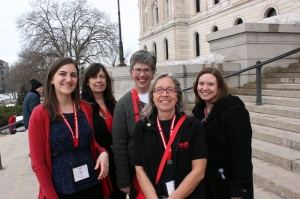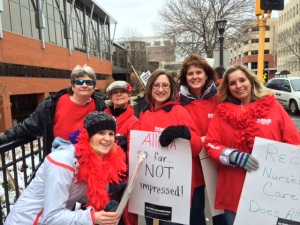 MNA Legislative Update
MNA Legislative Update
March 21, 2014
Nurse Licensure/Discipline
SF 1890/HF 1898: Nurse Licensing and Discipline Bill
Nurse Licensing and Monitoring bills are moving forward in both the House and Senate after hearings this week to try to address objections of stakeholders. In the Senate Judiciary Committee on Tuesday, the bill was amended to require the Board of Nursing to follow the same standards as other health licensing boards related to felony level criminal sexual offenses and remove a provision that would exempt the Board of Nursing from considering whether a nurse was rehabilitated when granting or renewing their license. Most importantly, the bill was also amended to clarify that violations of practice related to chemical dependency will be reported to the board only if they occur after the individual has begun monitoring by the Health Professional Services Program (HPSP). This will preserve the autonomy of the program and continue to encourage health professionals with chemical dependency issues to self-report.
In the House, the companion bill HF 1898 was heard on Wednesday in the State Government Finance committee. The House version of the bill was amended to remove a provision moving the administration of the Health Professional Services Program to the Department of Administration. It is the intention of the committee to revisit this issue again next year after the Management Analysis Division assesses the program.
Both bills include language that would require health licensing boards to complete any investigations into health professionals who present an imminent risk of harm within 60 days of suspending their license. We recognize that this is an imperfect solution and a hardship for nurses; it addresses the current gap between the discharge of a nurse from HPSP and discipline by the Board of Nursing, which sometimes can take many months and put patients at risk.
SF 1181/HF 1604: Mandatory Reporting of Drug Diversion
SF 1181, a bill mandating that employers report known diversion of controlled substances by employees of licensed health care organizations, was amended to again protect the integrity of HPSP. An amendment was adopted by the bill author, Senator Carla Nelson, to exempt employers who learn about diversion due to an employee’s participation in HPSP. This change will ensure that health care professionals will not be deterred from self-reporting because they may be required to notify their employer. The bill is now identical to the house version and was sent to both the floor and laid over for possible inclusion in an omnibus bill.
Minimum Wage
The bill to increase the Minimum Wage is still in negotiations between the House and Senate, and the sticking point continues to be whether it includes an automatic increase for inflation (indexing). The conference committee on this bill did not meet this week but advocates for $9.50 an hour plus indexing. Nurses have been meeting, calling and emailing their senators in record numbers. Where is your Senator on the minimum wage? Visit the blog Bluestem Prairie to see information collected by advocates for a higher minimum wage. If your Senator’s position is not included, contact them through the MNA Grassroots Action Center and ask them to raise the wage to allow low-wage workers to catch up and keep up!
If you’d like to do more and contact other union members to encourage them to call their Senator, there are minimum wage phone banks happening all over the state, in Minneapolis, St. Paul, St. Cloud, Brainerd and Worthington. Visit raisethewagemn.org and enter your ZIP code to find phonebanks in your region.
Women’s Economic Security Act
The WESA is a package of proposals to address barriers to women’s economic progress. It includes proposals for:
- Closing the gender pay gap, requiring private businesses that contract with the state to report on pay equity within their workforce.
- Increasing income for working women and their families by increasing the minimum wage to $9.50.
- Expanding access to high-quality, affordable childcare.
- Expanding family and sick leave for working families, including paid sick and safe leave and expanding unpaid leave under the Minnesota Parental Leave Act.
- Enhance protections for victims of domestic violence.
- Encouraging women in non-traditional, high-wage jobs and support growth for women-owned small businesses.
The bill was heard in the House Jobs committee and passed unanimously and will move on to the Ways and Means committee. The companion bill is moving in the Senate and will be heard in committee soon. MNA supports the WESA because addressing the economic gaps between men and women, strengthens all working families.
Budget and Taxes
After years of deficits and bookkeeping gimmicks, Minnesota is on firm financial footing with a projected $1.2 billion surplus. One of the major tasks of this legislative session is to come up with a supplemental budget and tax bill. The Senate, House, and Governor each have proposals including some tax cuts, some new spending, and placing some funds in a budget reserve for a “rainy day.” Once the House and Senate pass their tax bills, they will have to reconcile the differences between them, the most important of which is the House tax cut is greater than the Senate’s. We anticipate swift action on the tax bill.
Synthetic Drug bill
Representative Erik Simonson of Duluth has proposed a bill to stop the retail sales of synthetic drugs and provide education about the dangers of synthetics drugs for young people. With bipartisan support, the bill continues to move swiftly through the legislature; it passed the House Judiciary Committee on Tuesday and will move on to the Health and Human Services Finance Committee. The Senate companion bill, authored by Senator Roger Reinert of Duluth, is waiting to be heard by the Health, Human Services and Housing Committee of the Senate. MNA supports this important legislation.
Tanning
To address the dramatic rise in cases of melanoma and other skin cancers in young people, Senator Chris Eaton (an RN and member of MNA) and Representative JoAnn Ward introduced a bill to ban the use of tanning facilities by minors. Because the nursing profession strives to advance and promote the health and well-being of the public, MNA supports this bill to address a serious public health risk.
Mandatory Flu Vaccine
Earlier this session, legislators introduced a bill to require mandatory flu vaccination for all health care workers. While MNA considers vaccinations one important public health tool and encourages nurses to consider vaccination as a means of protecting themselves and their patients, we oppose attempts to legally mandate vaccines. Vaccination alone is not sufficient to protect patients and staff and control the spread of influenza. Mandating vaccine alone puts people more at risk because this approach ignores the fact the vaccine will only be effective in 6 out of 10 vaccinated and leave 4 out of 10 to potentially transmit the disease to others. There are also many other more effective measures to implement when attempting to control the spread of infectious disease, including allowing health care workers to use sick time when they’re sick without risking discipline. MNA nurses raised these concerns at Nurses Day on the Hill last week, and we are pleased to report that the bill appears to have been tabled for this session. We believe future attempts to address the spread of flu include:
- a voluntary, free and accessible vaccination program;
- paid sick time for all workers and no discipline for using sick time;
- broader infection control measures to limit the spread of illness;
- a requirement that the Workers Compensation Advisory Council to consider vaccination-related injury or illness a covered and compensable event.
Steve’s Law
Senator Chris Eaton introduced a bill to allow first responders to administer Naloxone, an opioid inhibitor, in cases of heroin overdose. MNA is supportive of this legislation as a way to address the rise in drug overdoses and deaths in Minnesota, and we are pleased to see the bill moving through the legislative process, on track for passage this session.
5% Campaign
Last session legislators passed a much-needed rate increase for nursing homes, 75% of which was required to go to workers. This year, advocates for long term care workers who do not work in nursing homes are proposing a 5% rate increase as well. It is our hope that the final legislation will include a similar requirement that 75% of the funds go to workers. This bill is moving and MNA supports it.
E-Cigarettes
MNA supports legislation that would regulate e-cigarettes in the same way as tobacco, including prohibiting their sales and marketing to children, and marketing as a smoking cessation tool. The bill is moving through the legislative process and we anticipate it is on track for passage.
Medical Marijuana
The bill to legalize medical marijuana has run into opposition from law enforcement organizations, and advocates met with the Governor this week to work out a compromise that will help some patients access treatment. MNA is in support of legislation allowing the use of medical marijuana under the supervision and direction of a physician for the alleviation of pain and nausea caused by certain conditions such as chemotherapy treatment, AIDS, seizures and glaucoma.


 On Thursday, April 3, for the seventh consecutive year, the Minnesota Nurses Association hosted students from nursing schools throughout the state for a lesson in advocacy that takes them beyond their bedside responsibilities.
On Thursday, April 3, for the seventh consecutive year, the Minnesota Nurses Association hosted students from nursing schools throughout the state for a lesson in advocacy that takes them beyond their bedside responsibilities.









